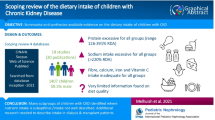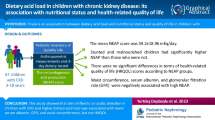Abstract
Objective
Our aim was to characterize the nutrient intake of children with chronic kidney disease (CKD) relative to recommended intake levels.
Methods
We conducted a cross-sectional study of dietary intake assessed by Food Frequency Questionnaire (FFQ) in The North American Chronic Kidney Disease in Children (CKiD) prospective cohort study. Nutrient intake was analyzed to estimate the daily consumption levels of various nutrients and compared with national guidelines for intake.
Results
There were 658 FFQs available for analysis; 69.9 % of respondents were boys, with a median age [Interquartile range (IQR)] of 11 years (8–15). Median daily sodium, potassium, and phosphorus intake was 3089 mg (2294–4243), 2384 mg (1804–3076), and 1206 mg (894–1612) respectively. Sodium and phosphorus consumptions were higher than recommended in all age groups. Caloric intake decreased with dropping glomerular filtration rate (GFR) (p = 0.003). The median daily caloric intakes were 1307 kcal in male children 2–3 years old, 1875 kcal in children 4–8 years old, 1923 kcal in those 9–13 years old, and 2427 kcal in those 14–18 years old. Respective levels for girls were 1467 kcal, 1736 kcal, 1803 kcal, and 2281 kcal. Median protein intake exceeded recommended levels in all age groups, particularly among younger participants. Younger children were more likely than older children to exceed the recommended intakes for phosphorus (p < 0.001) and the age-specific recommended caloric intake (p < 0.001). Macronutrient distribution (carbohydrate:fat:protein) was consistent with recommendation.
Conclusions
Children in the CKiD cohort consumed more sodium, phosphorus, protein, and calories than recommended. The gap between actual consumption and recommendations indicates a need for improved nutritional counseling and monitoring.




Similar content being viewed by others
Abbreviations
- ACEI:
-
Angiotensin-converting enzyme inhibitor
- BMI:
-
Body mass index
- CKD:
-
Chronic kidney disease
- CKiD:
-
Chronic Kidney Disease in Children
- EER:
-
Estimated energy requirement
- eGFR:
-
Estimated glomerular filtration rate
- ESRD:
-
End-stage renal disease
- FFQ:
-
Food Frequency Questionnaire
- IQR:
-
Interquartile range
- NHANES:
-
National Health and Nutrition Examination Survey
- uP/C:
-
Urine protein/creatinine ratio
References
National Kidney Foundation (2009) KDOQI clinical practice guideline for nutrition in children with CKD: 2008 update. Am J Kidney Dis 53(Suppl 2):S1–S124
Meneton P, Jeunemaitre X, de Wardener HE, MacGregor GA (2005) Links between dietary salt intake, renal salt handling, blood pressure, and cardiovascular diseases. Physiol Rev 85:679–715
Jones-Burton C, Mishra SI, Fink JC, Brown J, Gossa W, Bakris GL, Weir MR (2006) An in-depth review of the evidence linking dietary salt intake and progression of chronic kidney disease. Am J Nephrol 26:268–275
Buter H, Hemmelder MH, Navis G, de Jong PE, de Zeeuw D (1998) The blunting of the antiproteinuric efficacy of ACE inhibition by high sodium intake can be restored by hydrochlorothiazide. Nephrol Dial Transplant 13:1682–1685
USA Department of Agriculture and USA Department of Health and Human Services (2010) Dietary guidelines for Americans, 2010, 7th edn. USA Government Printing Office, Washington
Kidney Disease: Improving Global Outcomes (KDIGO) CKD Work Group (2013) KDIGO 2012 clinical practice guideline for the evaluation and management of chronic kidney disease. Kidney Int Suppl 3:1–150
Rees L, Mak RH (2011) Nutrition and growth in children with chronic kidney disease. Nat Rev Nephrol 7:615–623
Betts PR, Magrath G (1974) Growth pattern and dietary intake of children with chronic renal insufficiency. BMJ 2:189–193
Rees L, Jones H (2013) Nutritional management and growth in children with chronic kidney disease. Pediatr Nephrol 28:527–536
Eknoyan G (2011) Obesity and chronic kidney disease. Nefrologia 31:397–403
Kramer H (2013) Dietary patterns, calories, and kidney disease. Adv Chronic Kidney Dis 20:135–140
Wong CS, Gipson DS, Gillen DL, Emerson S, Koepsell T, Sherrard DJ, Watkins SL, Stehman-Breen C (2000) Anthropometric measures and risk of death in children with end-stage renal disease. Am J Kidney Dis 36:811–819
Huang MC, Chen ME, Hung HC, Chen HC, Chang WT, Lee CH, Wu YY, Chiang HC, Hwang SJ (2008) Inadequate energy and excess protein intakes may be associated with worsening renal function in chronic kidney disease. J Ren Nutr 18:187–194
USA Department of Agriculture, Agricultural Research Service What we eat in America. Available at: http://www.ars.usda.gov/Services/services.htm?modecode=80-40-05-30#. Accessed June 30, 2015
Furth SL, Cole SR, Moxey-Mims M, Kaskel F, Mak R, Schwartz G, Wong C, Munoz A, Warady BA (2006) Design and methods of the chronic kidney disease in children (CKiD) prospective cohort study. Clin J Am Soc Nephrol 1:1006–1015
Schwartz GJ, Brion LP, Spitzer A (1987) The use of plasma creatinine concentration for estimating glomerular filtration rate in infants, children, and adolescents. Pediatr Clin North Am 34(3):571–590
Schwartz GJ, Muñoz A, Schneider MF, Mak RH, Kaskel F, Warady BA, Furth SL (2009) New equations to estimate GFR in children with CKD. J Am Soc Nephrol 20(3):629–637
Schwartz GJ, Abraham AG, Furth SL, Warady BA, Munoz A (2010) Optimizing iohexol plasma disappearance curves to measure the glomerular filtration rate in children with chronic kidney disease. Kidney Int 77:65–71
Schwartz GJ, Schneider MF, Maier PS, Moxey-Mims M, Dharnidharka VR, Warady BA, Furth SL, Munoz A (2012) Improved equations estimating GFR in children with chronic kidney disease using an immunonephelometric determination of cystatin C. Kidney Int 82:445–453
Willett WC, Sampson L, Stampfer MJ, Rosner B, Bain C, Witschi J, Hennekens CH, Speizer FC (1985) Reproducibility and validity of a semiquantitative food frequency questionnaire. Am J Epidemiol 122:51–65
Blum RE, Wei EK, Rockett HR, Langeliers JD, Leppert J, Gardner JD, Colditz GA (1999) Validation of a food frequency questionnaire in Native American and Caucasian children 1 to 5 years of age. Matern Child Health J 3:167–172
Newby PK, Perterson KE, Berkey CS, Leppert J, Willett WC, Colditz GA (2003) Dietary composition and weight change among low-income preschool children. Arch Pediatr Adolesc Med 157:759–764
Newby PK, Peterson KE, Berkey CS, Leppert J, Willett WC, Colditz GA (2005) Beverage consumption is not associated with changes in weight and body mass index among low-income preschool children in SD. J Am Diet Assoc 104(7):1086–1094
Noori N, Kalantar-Zadeh K, Kovesdy CP, Bross R, Benner D, Kopple JD (2010) Association of dietary phosphorus intake and phosphorus to protein ratio with mortality in hemodialysis patients. Clin J Am Soc Nephrol 5:683–692
Huynh DTT, Dibley MJ, Sibbritt DW, Tran HTM (2008) Energy and macronutrient intakes in preschool children in urban areas of Ho Chi Minh City, Vietnam. BMC Pediatr 8:44
Committee to Review Child and Adult Care Food Program Meal Requirements, Food and Nutrition Board (2011) Child and adult care food program: aligning dietary guidance for all. National Academies Press, Washington
Lowenburg M (1993) Development of food patterns in young children. In: Pipes P, Trahms C (eds) Nutrition in Infancy and Childhood. 5th edn. Mosby, St. Louis, MO, pp 168–169
Rockett H, Colditz GA (1997) Assessing diets of children and adolescents. Am J Clin Nutr 65:S1116–S1122
Food and Nutrition Board, Institute of Medicine (2002) Dietary reference intakes for energy, carbohydrate, fiber, fat, fatty acids, cholesterol, protein, and amino acids (macronutrients). National Academies Press, Washington DC
Clark SL, Denburg MR, Furth SL (2015) Physical activity and screen time in adolescents in the chronic kidney disease in children (CKiD) cohort. Pediatr Nephrol. 635(31):801–808
Ludwig DS, Peterson KE, Gortmaker SL (2001) Relation between consumption of sugar-sweetened drinks and childhood obesity: a prospective, observational analysis. Lancet 357:505–508
Rockett HR, Wolf AM, Colditz GA (1995) Development and reproducibility of a food frequency questionnaire to assess diets of older children and adolescents. J Am Diet Assoc 95:336–340
American Heart Association, Gidding SS, Dennison BA, Birch LL, Daniels SR, Gillman MW et al. (2016) Dietary recommendations for children and adolescents: a guide for practitioners. Pediatrics 117(2):544–559
Noori N, Kalantar-Zadeh K, Kovesdy CP, Murali SB, Bross R, Nissenson AR, Kopple JD (2010) Dietary potassium intake and mortality in long-term hemodialysis patients. Am J Kidney Dis 56:338–347
Hoy MK, Goldman JD (2015) Potassium intake of the USA Population: what we eat in America, NHANES 2009–2010. Food Surveys Research Group Dietary Data Brief No. 10. September 2012. Available at: http://ars.usda.gov/Services/docs.htm?docid=19476. Accessed June 30
Uribarri J (2013) Dietary phosphorus and kidney disease. Ann NY Acad Sci 1301:11–19
Menon MC, Ix JH (2013) Dietary phosphorus, serum phosphorus and cardiovascular disease. Ann NY Acad Sci 1301:21–26
Murtaugh MA, Filipowicz R, Baird BC, Wei G, Greene T, Beddhu S (2012) Dietary phosphorus intake and mortality in moderate chronic kidney disease: NHANES III. Nephrol Dial Transplant 27:990–996
Fulgoni VL III (2008) Current protein intake in America: analysis of the National Health and Nutrition Examination Survey, 2003–2004. Am J Clin Nutr 87:S1554–S1557
Bross R, Noori N, Kovesdy CP, Murali SB, Benner D, Block G, Kopple JD, Kalantar-Zadeh K (2010) Dietary assessment of individuals with chronic kidney disease. Semin Dial 23:359–364
Phillps S, Edlbeck A, Kirby M, Goday P (2007) Ideal body weight in children. Nutr Clin Pract 22:240–245
Acknowledgments
Data in this manuscript were collected by the Chronic Kidney Disease in Children prospective cohort study (CKiD) with clinical coordinating centers (Principal Investigators) at Children’s Mercy Hospital and the University of Missouri – Kansas City (Bradley Warady, MD) and Children’s Hospital of Philadelphia and the Perelman School of Medicine at the University of Pennsylvania (Susan Furth, MD, Ph.D.), Central Biochemistry Laboratory (George Schwartz, MD) at the University of Rochester Medical Center, and data coordinating center at the Johns Hopkins Bloomberg School of Public Health (Alvaro Muñoz, Ph.D.). The CKiD Study is funded by the National Institute of Diabetes and Digestive and Kidney Diseases, with additional funding from the Eunice Kennedy Shriver National Institute of Child Health and Human Development, and the National Heart, Lung, and Blood Institute (U01-DK-66143, U01-DK-66174, U01-DK-82194, U01-DK-66116). The CKiD website is located at http://www.statepi.jhsph.edu/ckid.
Support for the nutritional analysis of the FFQ was provided by the National Center for Research Resources, Grant UL1RR024134, and is now at the National Center for Advancing Translational Sciences, Grant UL1TR000003. The content is solely the responsibility of the authors and does not necessarily represent the official views of the NIH.
Author information
Authors and Affiliations
Corresponding author
Ethics declarations
Conflict of interest
The authors have indicated they have no potential conflicts of interest to disclose.
Funding source
National Institute of Diabetes and Digestive and Kidney Diseases, with additional funding from the Eunice Kennedy Shriver National Institute of Child Health and Human Development and the National Heart, Lung and Blood Institute (grants U01-DK-66143, U01-DK-66174, U01DK-082194, and U01-DK-66116).
Ethical approval
All procedures performed in studies involving human participants were in accordance with the ethical standards of the institutional and/or national research committee and with the 1964 Declaration of Helsinki and its later amendments or comparable ethical standards.
Informed consent
Informed consent was obtained from all participants.
Electronic supplementary material
Below is the link to the electronic supplementary material.
ESM 1
(DOCX 14 kb)
Rights and permissions
About this article
Cite this article
Hui, W.F., Betoko, A., Savant, J.D. et al. Assessment of dietary intake of children with chronic kidney disease. Pediatr Nephrol 32, 485–494 (2017). https://doi.org/10.1007/s00467-016-3491-5
Received:
Revised:
Accepted:
Published:
Issue Date:
DOI: https://doi.org/10.1007/s00467-016-3491-5




